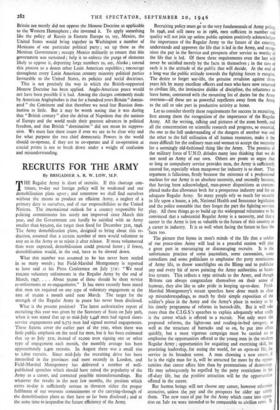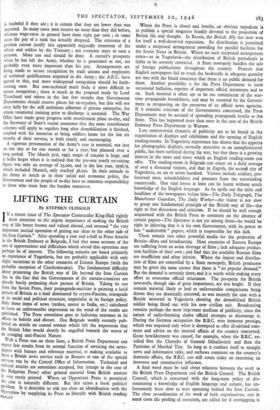RECRUITS FOR THE ARMY
By BRIGADIER A. R. W. LOW, M.P.
THE Regular Army is short of recruits. If this shortage con- tinues, to-day our foreign policy will be weakened and our demobilisation plans upset ; and tomorrow we shall find ourselves without the means to produce an efficient Army, a neglect of a primary duty to ourselves, and of our responsibilities to the United Nations. The international outlook for a country responsible for policing commitments has surely not improved since March this year, and the Government can hardly be satisfied with an Army smaller than 650,000, the target then fixed for December 31st, 1946. The Army demobilisation plans, designed to bring about this re- duction, assumed that a certain number of men would volunteer to stay on in the Army or to rejoin it after release. If more volunteered than were expected, demobilisation could proceed faster ; if fewer, demobilisation would, in the end, have to be slowed down.
What this number was assumed to be has never been settled in so many words ; but Field-Marshal Montgomery is reported to have said at his Press Conference on July 3:st : "We need oo,000 voluntary enlistments in the Regular Army by the end of March, 1947. . . . About 50,000 of these should be short service re-enlistments or re-engagements." It has more recently been stated that men are required on any type of voluntary engagement at the rate of to,000 a month until next March. The target for the • strength of the Regular Army in peace has never been disclosed.
What is the present position? The latest authoritative report of recruiting this year was given by the Secretary of State on July 3oth, when it was stated that up to mid-July 1,448 men had signed short- service engagements and 9,572 men had signed normal engagements. These figures cover the earlier part of the year, when there was little public emphasis on the need for men, but it has been estimated that up to July 31st, instead of to,000 men signing one or other type of engagement each month, the monthly average has been approximately 2,400 recruits. In August there was a small rise to 2,600 recruits. Since mid-July the recruiting drive has been intensified in the provinces and most recently in London, and Field Marshal Montgomery has delivered a number of well- publicised speeches which should have raised the popularity of the Army as a career, and corrected possible misunderstandings. But whatever the results in the next few months, the position which exists to-day is sufficiently serious to threaten either the proper fulfilment of our overseas commitments or the carrying-through of the demobilisation plans as they have so far been disclosed ; and at the same time to jeopardise the future efficiency of the Army.
Recruiting policy must go to the very fundamentals of Army policy. In 1946, and still more so in 1966, men sufficient in number and quality will not join up unless public opinion positively acknowledges the importance of the Regular Army to the future of the country, understands and approves the life that is led in the Army, and recog- nises the pay in the Service and prospects after service as worthy of the life that is led. Of these three requirements even the last will never be satisfied merely by the facts in themselves ; in the case of each it is the attitude of the public that will decide. At the end of a long war the public attitude towards the fighting forces is escapist. The desire to forget war-life, the genuine revulsion against those years felt by many excellent officers and men who have now returned to civilian life, the instinctive dislike of discipline, the reluctance to leave home, contrasted with the mounting list of duties for the Army overseas—all these are as powerful repellents away from the Army as the call to take part in productive activity at home.
Let us consider shortly these requirements for success in recruiting, first among them the recognition of the importance-of the Regular Army. All the writing, talking and pictures of the atom bomb, and all the concentration on scientific research and progress, so essential, the one to the full understanding of the dangers of another war and the other to the full utilisation of all human resources, make it the more difficult for the ordinary man and woman to accept the necessity for a seemingly old-fashioned thing like the Army. The promise of the military force of U.N.O. deludes many into thinking that we do not need an Army of our own. Others are prorfe to argue that so long as compulsory service provides men, the Army is sufficiently catered for, especially when manpower for industry is so short. That argument is fallacious, firstly because the existence of a professional nucleus for our Army is an absolute necessity, and secondly because, that having been acknowledged, man-power dispositions as contem- plated make due allowance both for a prosperous industry and for an adequate Regular Army. So many people rely so much for security in life upon a house, a job, National Health and Insurance legislation and the police constable that they forget the part the fighting services play., All these things,go to build up the widespread reluctance to be convinced that a substantial Regular Army is a necessity, and that a career in the Army is just as valuable to the future of this country as .‘a career in industry. It is as well when facing the future to face the facts too.
The picture that forms in men's minds of the life that a soldier of our peace-time Aimy will lead in a peaceful station will play a great part in encouraging or discouraging recruits. It is the unfortunate practice of some journalists, some cartoonists, some comedians and some politicians to emphasise the petty restrictions of Army life, to throw searchlights on .the Blimp and to publicise any and every bit of news painting the Army authorities as heart- less tyrants. This reflects a 193o attitude to the Army, and though Britons can always congratulate themselves on their sense of humour, they also like to take pride in keeping up-to-date. Field- Marshal Montgomery's recent speeches have done much to clear up misunderstapdings, as much by their simple exposition of the soldier's place in the Army and the Army's place in society as by his timely programme of reforms in barrack-life. But it will take more than the C.I.G.S.'s speeches to explain adequately what really is the career which is offered to p recruit. Not only must the proposed reforms, the lights-out and reading-in-bed category, as well as the structure of barracks and so on, be put into effect quickly, but a most vigorous campaign must be carried on to emphasise the opportunities offered to the young man in the modern Regular Army ; opportunities for acquiring and exercising skill, for practising leadership, for seeing the world, for an open-air life, for service in its broadest sense. A man choosing a new career, if he is the right man for it, will be attracted far more by the oppor- flinities that career offers him than by protestations of democraeY. He may subsequently be repelled by the petty restrictions in his off-duty life, but the positive attraction will be the opportunities offered in the career.
But human beings will not choose any career, however otherwise attractive, unless the pay and the prospects ,for older age satisfy them. The new rates of pay for the Army which came into opera- tion on Tulv 1st were intended to be comparable to civilian rates. It is doubtful if they are ; it is certain that they are lower than was expected. In many cases men receive no more than they did before, whereas wage-rates in general have risen eight per cent. ; in some cases the pay of a rank has actually dropped. The existence of a pension cannot justify this apparently niggardly treatment of the officer and soldier by the Treasury ; not everyone stays to earn a pension. More can and should be done. A recruit's prospects when he has left the Army, whether he is pensioned or not, are probably even more important than his pay. Arrangements are being made to secure recognition by trade unions and employers of technical qualifications acquired in the Army ; the A.E.U. have agreed to this, and more widespread recognition should be forth- coming soon. But non-technical merit finds it more difficult to secure recognition ; there is much in the proposal made by Lord Trenchard and others in the last few months that Government Departments should reserve places for ex-regulars, but this will not cater fully for the still ambitious adherent of private enterprise, for whom vocational training prior to discharge is essential. The War. Office have made great progress with resettlement plans to-day, and the Secretary of State's recent assurance that the same resettlement schemes will apply to regulars long after demobilisation is finished, coupled with his intention to bring soldiers home for the last six months of their service, is both timely and encouraging.
A vigorous presentation of the Army's case is essential, not just on one day or for one month or for a year,'but planned over a long period. The March 31st, 1947, target of zoo,000 is large, and it bulks larger when it is realised that the pre-war yearly recruiting figure was only an average of 25,00o, and in the last year, 1938/9, which included Munich, only reached 38,000. In their attitude to the Army as much as in their social and economic policy, the Government and the people of to-day have an immense responsibility to those who must bear the burden tomorrow.



























 Previous page
Previous page